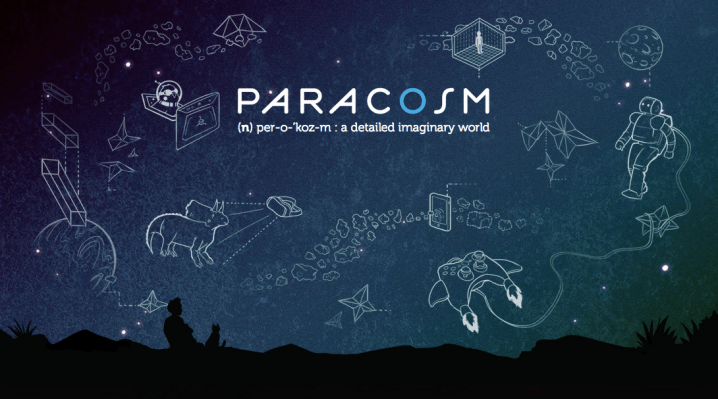The rise of immersive headsets like the Oculus VR, innovations in gaming and mapping, and advances in robotics have put a spotlight on three-dimensional technology, whose algorithms and visualizations will be a key to whether all this new hardware and video-based software is realistic and useful enough to win over users. That’s having a knock-on effect how 3D startups are growing.
In one of the latest developments, Parascom, a Florida-based specialist in cloud-based 3D mapping software, has picked up a $3.3 million seed round of funding — money it will use to build out its team and develop more and better algorithms for robotics, gaming and other applications that are built to operate in real-world space — or, as founder and CEO Amir Rubin put it to me, to “take the digital world beyond screens and enable machines to understand the world as we do, turning your living room into a holodeck.”
The round, led by Atlas Venture, also had participation from Roomba maker iRobot, Osage University Partners, BOLDstart Ventures, New World Angels, Deep Fork Capital and unnamed angel investors.
Paracosm is not the only 3D startup to come out of Florida. In October, Florida-based firm Magic Leap made big waves when it announced a $542 million round of funding led by Google to develop 3D technology that it has yet to reveal in much detail.
Nor is it the only 3D visualization startup to attract attention from strategic players. Also last month, Google’s DeepMind made two acquisitions in the UK, one of them being Vision Factory, a spinout from Oxford University whose engineers have been focusing on writing algorithms to power computer vision systems — used, for example, by robots to process 3D objects and movements.
“Florida has a huge 3D community, partly because of the heritage of Disney,” he says, but also because of the presence of EA and other gaming companies (Trendy Entertainment, makers of Dungeon Defenders, the first game to port the Unreal Engine to Android, is also based in Florida), the University of Florida and its extensive 3D simulation research, and “huge military contracts that go through Orlando.”
Interestingly, Paracosm has a connection to Google, too: it was one of the original development partners for Project Tango, helping with early 3D mapping and the Unity game engine code on the platform. It’s not investing in the company, “but we have a close relationship with them — as a scrappy startup,” he adds.
From cows to countertops
Parascom’s particular position in the spectrum of companies working in 3D is that it develops mapping technology, but also the ability for a robot, or something/someone else, to effectively reason within that space.
“We are looking to build a general case of having a 3D map for your home or office, or an airport or museum, and then making that something that robots or others can interact with,” Rubin says. Hence, the concept of a holodeck.
To explain what he means, he gives me the example of how a normal human recalls a room.
“If you go to a friend’s house for a dinner party, you know where the closet or bathroom is, you have built in your mind a map of the layout of the house and the most important landmarks. You know where the kitchen is and the countertop all these little details that we take for granted,” he says. “Those don’t exist in the world of software and robots. What we are trying to accomplish is to give way for [non-human entities] to understand those same shapes and layouts. If they can do this, it unlocks totally new applications and possibilities that have never been achievable before.”
This is done, in layman’s terms, by way of cloud-based processing using video, which Paracosm pieces into a 3D model that it can then parse for objects that it recognises and translates into code.
Rubin trained (in Florida, of course) as a computer engineer, and has been working at startups since he graduated, with his first company also working in spatial perception but from a different angle: they built drones, among other things. Most recently, he was a a 3D startup, also in Florida, called Shadow Health, which focused on immersive pictures of hospital rooms. He also holds a patent for weighing cows based on photographs of them. Really.
The initial inspiration for Paracosm came 10 years ago when Rubin was backpacking through Europe and started to wish that he could see what a particular ruin looked like when it was still a living space. “You feel the power of history and I would have liked to have seen these rocks before they were just rocks,” he says.
But he says that he could never fiture out how to do it until two years ago. “I woke up in the middle of the night with an a-ha moment,” he says. Bringing together four friends with respective expertise in areas like machine learning and interactivity, they became the basis of Paracosm. “They basically helped craft the vision and how to figure out how to solve the problem. The initial idea was terrible but after brainstorming we have this whole thing figured out the frame work of what we are capable of accomplishing and where it can go in the future.”
As for that future, Rubin says for now they are trying to leave the applications open-ended and focus just on making the tech work. The conflict of being purely focused on tech, however, versus thinking entrepreneurially of how to apply it remains. “This is something that my cofounders and I think a lot about,” he says. “For now, we are looking to build the core technology, but we know there are so many vertical applications that yes we expect that we may commercialise one or two of them ourselves, to eat own dogfood.”
